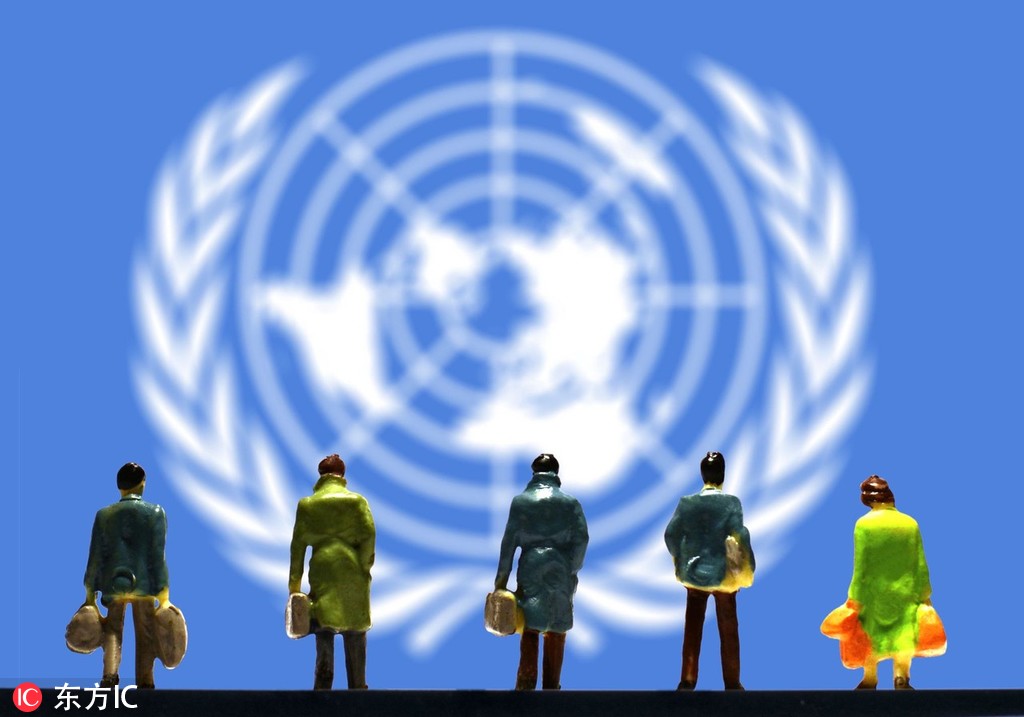China should help expedite UN reform


China's contribution to the United Nations' regular budget will rise from 7.92 percent in 2016-18 to 12.01 percent in the next three years, says a resolution adopted by the UN General Assembly on Saturday. So China will surpass Japan to become the second-largest contributor-behind only the United States-to the UN budget.
Japan's contribution will drop from 9.68 percent to 8.56 percent, but the US' will stay unchanged at 22 percent, prompting some commentaries in Japanese media outlets to say that the continued decline in Japan's contribution shows the country's influence in the UN has been declining, and if this trend continues it could lose more say in the world body.
They also said Japan should attach greater importance to its status in the international community, and warned that if it fails to make larger contributions to the UN and other international organizations, it may fail to achieve its coveted goal of becoming a permanent member of the UN Security Council.
Concerns over Chinese people's interests
In contrast to Japanese concerns, some Chinese scholars worry that if China, as a developing country, shoulders more and more responsibilities in international institutions and contributes increasing amounts of funds, the interests of the Chinese people could be seriously compromised.
Member states make contributions to the UN budget every three years based on their gross national income (GNI) among other factors. And given China's continued economic growth and the fact that it is the world's second-largest economy, it is not surprising for China to become the second-largest contributor to the UN budget.
But since China's per capita GNI is far lower than that of developed countries, and if China does not urge the UN to reform its budget distribution system soon, it will continue to assume international obligations not commensurate with its national strength. As a result, ordinary Chinese people will have to bear a heavy burden.
That the UN budget distribution is based on member states' GNI other than their per capita gross national product means countries with a large population have to pay a large share of the budget.
As the world's most populous country, China's GNI has grown rapidly in recent years, but its per capita GNI is still relatively low, so the ever-growing share of China's contribution to the UN and other international agencies are not in line with its actual economic state.
Should contribute aid within its capacity
But as China has entered or is about to enter the ranks of middle-income economies, it is capable of paying its share of the UN budget and participating in UN peacekeeping operations. And indeed, China should give international aid within its capacity and under the UN leadership, as this is a concrete manifestation of it fulfilling its global obligations and necessary responsibility as a permanent member of the UN Security Council.
However, despite all UN member states, big or small, being equal, their rights must match their obligations when it comes to UN budget distribution reform. Any reform that does not adhere to the "fair but differentiated" principle or take into account the actual economic condition of developing countries will go in the wrong direction.
Thanks to the steady development of the Chinese economy, the rise in its contributions to the UN and its affiliated agencies is the price China has to pay for marching into the global arena. But being the largest developing country, China must also push for UN reform, because only through deeper reform and improvement in the UN's efficiency can we make better use of the members' contributions.
If the UN struggles to deal with some major issues, such as settling the power games of big countries, then the contributions made by China and other developing countries will be used for settling meaningless quarrels, which would not be conducive to maintaining world peace or the development of the UN itself.
China should actively push the UN to expedite the pace of reform, improve its work efficiency by streamlining bureaucracy, as well as consider the situation of developing countries and establish a differentiated budget distribution mechanism. Only in this way, can we make the UN reform help the developing countries lift their people out of poverty, and prompt the developed countries to make greater contributions to world peace.
UN must more actively safeguard world peace
More important, China should support the UN to play a bigger role in safeguarding world peace and promoting the development of all countries. As a signatory to the UN Charter, China hopes the UN, following the basic principles set out by the Charter, will earnestly protect the interests of developing countries through reforms. In recent years, China has played an increasingly active role in the UN and its Security Council, and taken the initiative to set important topics on a series of major issues while expressing its views on hotspot issues, in order to maintain world peace and development.
So far, China's contribution to the UN has been within its capacity. And we should not consider China's contribution to the UN budget unreasonable just because of the large increase in its proportion. China should fulfill its obligations, but simultaneously it should also unite with other developing countries to accelerate the reform of the UN and its affiliated institutions.
The author is a professor of law at Zhongnan University of Economics and Law.


































